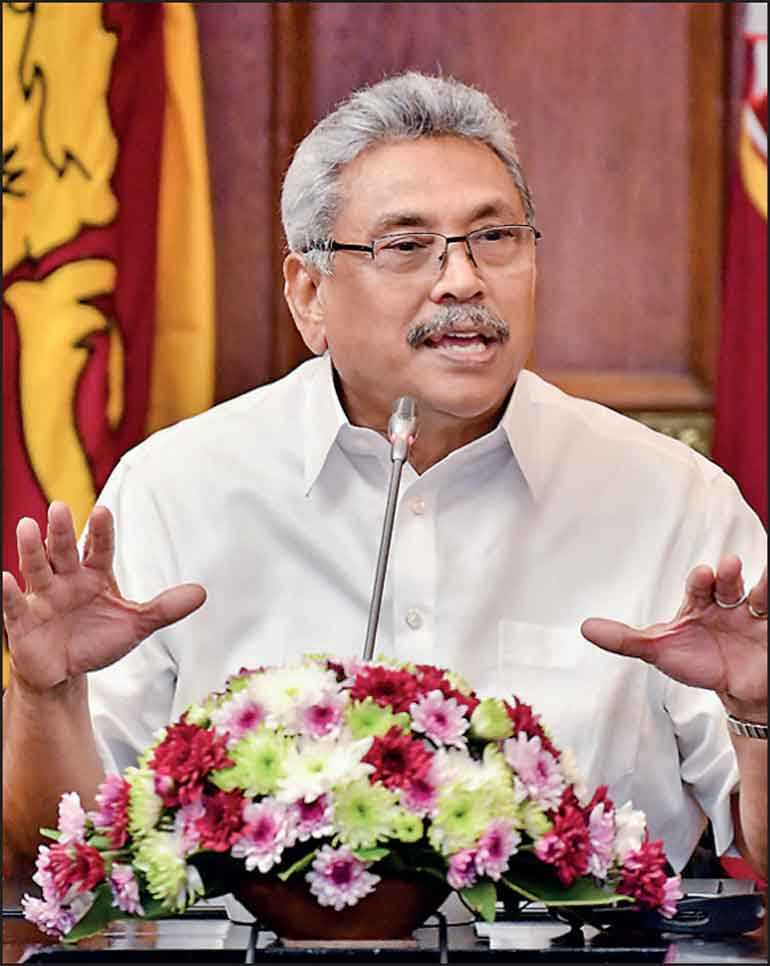Sunday Feb 15, 2026
Sunday Feb 15, 2026
Friday, 6 March 2020 00:00 - - {{hitsCtrl.values.hits}}

By Nisthar Cassim
President Gotabaya Rajapaksa yesterday said in the first 100 days of his rule much was achieved, but opined that he was not satisfied with the progress as per his standards.
“Yes we did a lot in the first 100 days. But as per my standards, I am not satisfied,” Rajapaksa said during a luncheon meeting with editors.
Rajapaksa pointed to the lack of a two-thirds majority in Parliament, and partly blamed the 19th Amendment of the Constitution, for the failure of a more progressive and successful first 100 days of Presidency.
As an example, he noted that the Amendment to the Vote on Account had to be withdrawn, since the Opposition was wary. The Government sought Rs. 367 billion to settle overdue payments, and to increase limit on borrowing to Rs. 1088 billion, but the UNP opposed the increase. Rajapaksa said that as a result, a few of the pledges made in his election campaign could not be completed.
The President insisted that securing a two-thirds majority at next month’s General Election was critical to more effective and smoother governance, including the amendment of the Constitution.
“People voted me with high expectations to deliver as the Executive President. If the President can’t deliver what the people want, what is the use of the Constitution,” Rajapaksa said.
“One (Presidential) term is enough for me, but I must be able to deliver in that term, and the Constitution must allow it,” he added.
He recalled how the 19th Amendment made it difficult to govern the country effectively. “People realised the impracticality as well as dangers of the 19th Amendment, and I was given a clear mandate at the Presidential Election to abolish it. I need the two-thirds majority to do so,” said President Rajapaksa, who added that he will join the General Election campaign rally, urging people to give this mandate and elect a strong Government.
President also dismissed possibilities of him working with the UNP’s Sajith Premadasa, in the event his alliance wins and he thereby becomes the Prime Minister. “It is not about people but policies,” Rajapaksa said, adding that on 16 November, people voted out the previous regime and its policies. “The SLPP and the SLFP have come together on policies, and our Government’s future will be successful on this strong foundation of common policies.”
He said that if one factors in the ethnic lines with which people in the North and East voted at Presidential Election, and not policies, his victory at the Presidential Election was a bigger margin than what the poll showed.
Rajapaksa also questioned the “independence” of independent commissions and opined that people mistakenly think certain organs are not independent in their own right. “Why do people assume the IGP is not independent but political, even though he may have joined the Police during a different regime, and worked his way up over the years during successive regimes,” queried the President, and noted that interest groups still wanted an independent Police Commission. Rajapaksa also had an issue with one member of the Elections Commission, alleging he is politically biased yet serving an independent commission. “Commissions must be truly independent,” he said, adding however that issues or shortcomings within various organisations and sectors, such as the Police, must be addressed from within.
Referring to the withdrawal of Sri Lanka from Resolution 30/1 at the UNHRC, the President said he received a mandate from the people to ensure the sovereignty and independence of Sri Lanka is not compromised. No country has co-sponsored a resolution against itself in the UNHRC, he added.
“We explained this to the international community, and they have understood our position,” the President noted.
